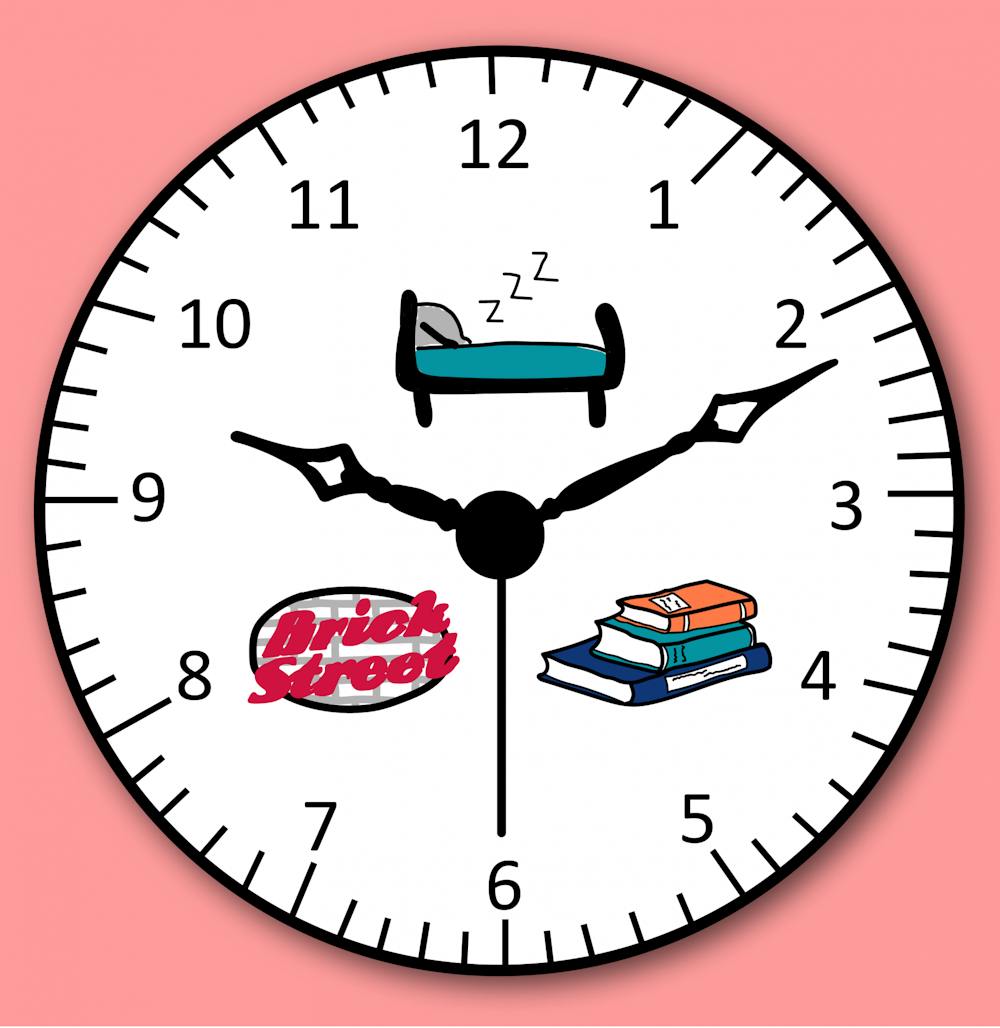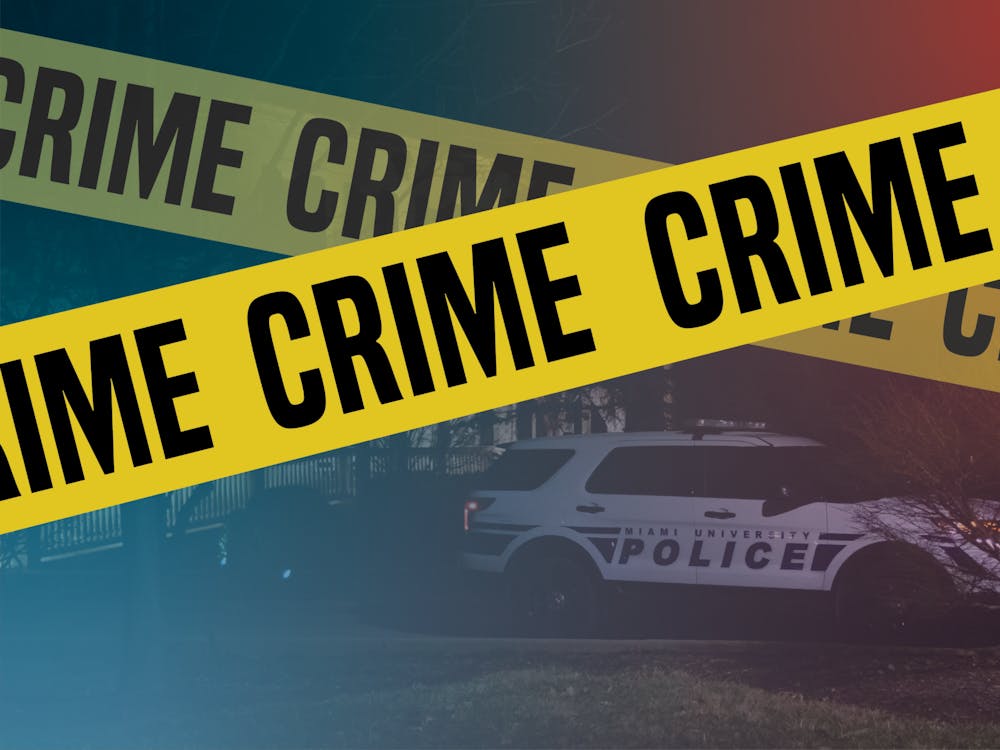All-nighters at the library. All-nighters at Brick Street. Such behaviors are symbolic of the stereotypical Miami University student’s work-life balance: work hard, play harder, repeat.
But for Preston Anderson, a junior finance and business analytics major, that sort of lifestyle leaves much to be desired.
“It would be super exhausting because you’re working hard, you’re playing hard, you’re always on and going at it full throttle,” Preston said. “I personally don’t think it’s a super healthy habit to get into.”
“Appreciate each thing as it comes”
Anderson minors in studio art, has a leadership position in the business fraternity Alpha Kappa Psi and has worked with several consulting firms. He is also part of the visual arts club and running club at Miami — making it all the more important that he manages his time wisely.
Anderson said his focus on being mentally aware and present in the moment helps him keep up with his many commitments.
“I listen to a lot of podcasts that emphasize that if you’re mentally aware and focused every moment of every day, you get a lot more out of life,” Anderson said. “As I am so busy, I try to maximize that time and not necessarily go from one thing to the next but really appreciate each thing as it comes.”
Anderson said the social nature of his academics and extracurriculars help make his work-life balance more maintainable. His leadership activities and hobbies allow him to spend time with people he enjoys while also growing both professionally and personally.
“I don’t have the liberty to study the week before”
Some students enter Miami with efficient time management skills, but for others, a learning curve is involved. Madison Miner, a senior public health major with a co-major in pre-medical studies, said it took time for her to maintain a healthy balance.
“I think that over my four years I’ve gotten better at it, but it’s taken a lot of effort and skill to be able to really prioritize myself as a person and my other responsibilities,” Miner said.
Miner got involved with many of her commitments — including the women’s varsity synchronized skating team, co-president of HAWKS peer health educators and a volunteer Spanish tutor — during the COVID-19 pandemic. As pandemic restrictions eased, Miner had to learn how to manage a fully in-person schedule.
Enjoy what you're reading?
Signup for our newsletter
“It was an adjustment,” Miner said. “I had to mentally reset because I took on those roles at a time when I had more ability to get on a Zoom call versus drive to Western campus and go to an in-person meeting.”
Miner said that planning her time has been an important aspect of maintaining her work-life balance. She doesn’t just schedule her classes and homework, but also when to call her parents and when to focus on herself rather than academics.
With her busy training schedule, Miner said she studies for exams throughout the semester to do well.
“I don’t have the liberty to study the week before or the night before an exam, so I plan out my study times in advance,” Miner said. “So it’s like, I have to get through chapter one now, and I have to make my study sheet and my Quizlet because I know when I’m at a competition or something, I’m not going to be able to do that.”
“Student first, athlete second”
Lilly Peterson, a senior strategic communication major and a member of the varsity field hockey team, said her demanding practice schedule makes it hard to divide her time.
“Usually we say ‘student first, athlete second,’ but considering the workload, I would definitely say it’s the other way around,” Peterson said. “We practice three hours a day, six days a week. And then with traveling, etc., it’s very time consuming. And then obviously, you still have to make time for schoolwork, which is hard. So lots of long nights and not a lot of free time.”
While Peterson loves her sport, she admits that her lack of balance can be exhausting.
“It’s very, very stressful,” Peterson said. “You don’t really have a social life, your social life is your team. Which is great, but it’s physically, as well as mentally, very challenging to keep up with that.”
Despite her jam-packed schedule, Peterson said she still makes sure to prioritize getting enough sleep — at least nine hours a night.
“Sleep is more important than anything, because if you don’t get enough you won’t function academically or physically the next day,” Peterson said.
Rest and destress
While many Miami students work hard in their academics, their ways of destressing after a long week vary. Anderson said picking up new hobbies helps him unwind.
“Learning a new task is super enjoyable for me,” Anderson said. “Recently, I’ve been getting into guitar so it’s been really relaxing to just try learning that without any pressure to do well in school.”
Miner said she enjoys taking “mental health drives” to get away from all the distractions in her busy life. In the car, she can’t be distracted by her phone or email.
Peterson said most of her free time is dedicated to catching up on rest. After a week of constantly being on the go, she prefers to do nothing on her off days.
“I don’t mind spending all day in bed or on the couch, because [I] never get to do it,” Peterson said. “My teammates and I like to go to other sports games, we like to just hang out at our house and cook together. But nothing crazy because again, we’re all exhausted.”
A drop in “playing hard”
While some may prioritize these types of relaxing activities, many Miami students still “play hard.” But Kimberly Moore, dean of students, said that’s been less common in recent years.
“We have seen a decline in alcohol and drug violations of the code of conduct, and I want to be careful not to say that that means it’s happening less, but the decision-making around that is shifting,” Moore said. “We’re seeing a lot more students who are really vocal about their choice to not drink until they’re 21.”
In addition to making smarter choices about alcohol, more students are taking steps to prioritize their mental well-being above their other commitments.
“Students are by and large far more open about talking about their mental health and what that means,” Moore said. “There’s more awareness of the intersections of being a student and that there’s a bigger picture going on.”
While students are more aware of the various mental health resources Miami offers, Peterson said her busy schedule makes it difficult to access them.
“Our team has our own mental health trainer, so there’s a lot of resources for that,” Peterson said. “But then it’s also like, when do I have the time to go there and talk to someone?”
For Miner it’s usually her social life that suffers when things get busy, not her mental health.
“Mostly it’s like, ‘I was gonna go out with friends tonight, but because of X exam or because of this responsibility with HAWKS, I won’t do that,’” Miner said.
While Anderson values his academics, he said he is less willing to go above and beyond in them due to the lack of extra reward for doing so.
“It’s not easy to admit, but I would say I kind of hit the minimum bar that I would need for the class,” Anderson said. “I could spend more time perfecting the class content, or I could spend just enough time and then I have more free time or more time to work on other classes.”




